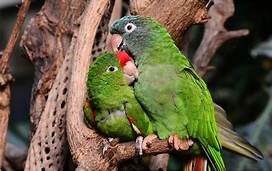How Long Do Pet Birds Live?
When you bring a pet bird into your home, you're making a commitment to care for that animal for its entire life. But how long do pet birds live? The answer to this question depends on a number of factors, including the species of bird, its diet, and its overall health.

Average Lifespans of Common Pet Birds
The average lifespan of a pet bird can vary widely depending on the species. Some of the most common pet birds and their average lifespans include:
- Budgies: 5-8 years
- Canaries: 10-15 years
- Cockatiels: 15-20 years
- Finches: 5-10 years
- Lovebirds: 10-15 years
- Parakeets: 5-8 years
- Pigeons: 15-20 years
- African Greys: 30-40 years
- Amazons: 25-30 years
- Cockatoos: 20-30 years
- Macaws: 40-50 years
- Parrots: 20-30 years
Factors That Affect a Bird's Lifespan
In addition to species, there are a number of other factors that can affect a bird's lifespan, including:
- Diet: A healthy diet is essential for a long and healthy life. Birds should be fed a diet that is specifically designed for their species and that provides them with all the nutrients they need.
- Exercise: Birds need to be able to exercise regularly in order to stay healthy. This means providing them with a cage that is large enough for them to move around comfortably and that has plenty of toys to keep them entertained.
- Stress: Stress can take a toll on a bird's health and shorten its lifespan. Birds should be kept in a calm and quiet environment and should be protected from predators and other animals that may frighten them.
- Veterinary care: Regular veterinary care is essential for catching and treating health problems early. Birds should be taken to the vet for regular checkups and should be vaccinated against common diseases.
How to Help Your Bird Live a Long and Healthy Life
There are a number of things you can do to help your bird live a long and healthy life, including:
- Provide your bird with a healthy diet: Feed your bird a diet that is specifically designed for its species and that provides it with all the nutrients it needs.
- Make sure your bird has plenty of exercise: Provide your bird with a cage that is large enough for it to move around comfortably and that has plenty of toys to keep it entertained.
- Reduce stress in your bird's environment: Keep your bird in a calm and quiet environment and protect it from predators and other animals that may frighten it.
- Take your bird to the vet for regular checkups: Regular veterinary care is essential for catching and treating health problems early. Birds should be taken to the vet for regular checkups and should be vaccinated against common diseases.
By following these tips, you can help your bird live a long and healthy life.
Declaration: All article resources on this website, unless otherwise specified or labeled, are collected from online resources. If the content on this website infringes on the legitimate rights and interests of the original author, you can contact this website to delete it.



